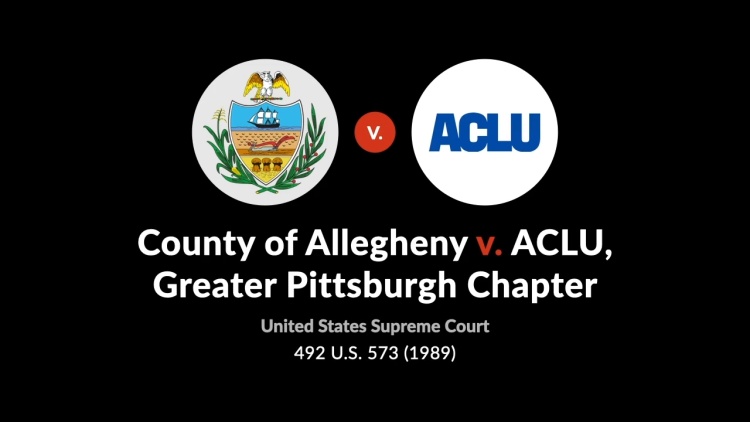County of Allegheny v. American Civil Liberties Union, Greater Pittsburgh Chapter
United States Supreme Court
492 U.S. 573, 109 S.Ct. 3086, 106 L.Ed.2d 472 (1989).
- Written by Abby Roughton, JD
Facts
The county courthouse in Allegheny County, Pennsylvania (the county) (defendant) housed courtrooms and government offices. Since 1981, the county had allowed a Roman Catholic group to place a creche (i.e., a scene depicting the birth of Jesus) in the courthouse during the Christmas season. During the 1986-to-1987 season, the county displayed the creche prominently in the courthouse’s main public area from late November through early January. The county placed plants and evergreen trees around the creche and displayed no other decorations in the area. A block from the courthouse was the City-County Building, jointly owned by the county and the City of Pittsburgh (the city) (defendant). The building housed offices for city officials, among other things. For several years, the city had erected a large Christmas tree outside a city-maintained entrance to the building. During the 1986 season, the city erected a 45-foot tree and placed a plaque in front of the tree with a statement that Pittsburgh saluted liberty during the holiday season. Since 1982, the city had also included a Chanukah menorah in the display at the entrance to the building. During the 1986 season, the city placed an 18-foot menorah next to the Christmas tree. In December 1986, the Greater Pittsburgh Chapter of the American Civil Liberties Union (ACLU) (plaintiff) sued the county and the city in federal district court, seeking to enjoin the displays of the creche and menorah. The ACLU claimed that the displays violated the Establishment Clause of the First Amendment. The district court denied the ACLU’s requested relief, but the appellate court reversed. The appellate court held that placing the creche and menorah at public government buildings constituted an impermissible endorsement of Christianity and Judaism. The United States Supreme Court granted certiorari.
Rule of Law
Issue
Holding and Reasoning (Blackmun, J.)
Concurrence (O’Connor, J.)
Concurrence/Dissent (Brennan, J.)
Concurrence/Dissent (Kennedy, J.)
Concurrence/Dissent (Stevens, J.)
What to do next…
Here's why 904,000 law students have relied on our case briefs:
- Written by law professors and practitioners, not other law students. 47,100 briefs, keyed to 995 casebooks. Top-notch customer support.
- The right amount of information, includes the facts, issues, rule of law, holding and reasoning, and any concurrences and dissents.
- Access in your classes, works on your mobile and tablet. Massive library of related video lessons and high quality multiple-choice questions.
- Easy to use, uniform format for every case brief. Written in plain English, not in legalese. Our briefs summarize and simplify; they don’t just repeat the court’s language.





